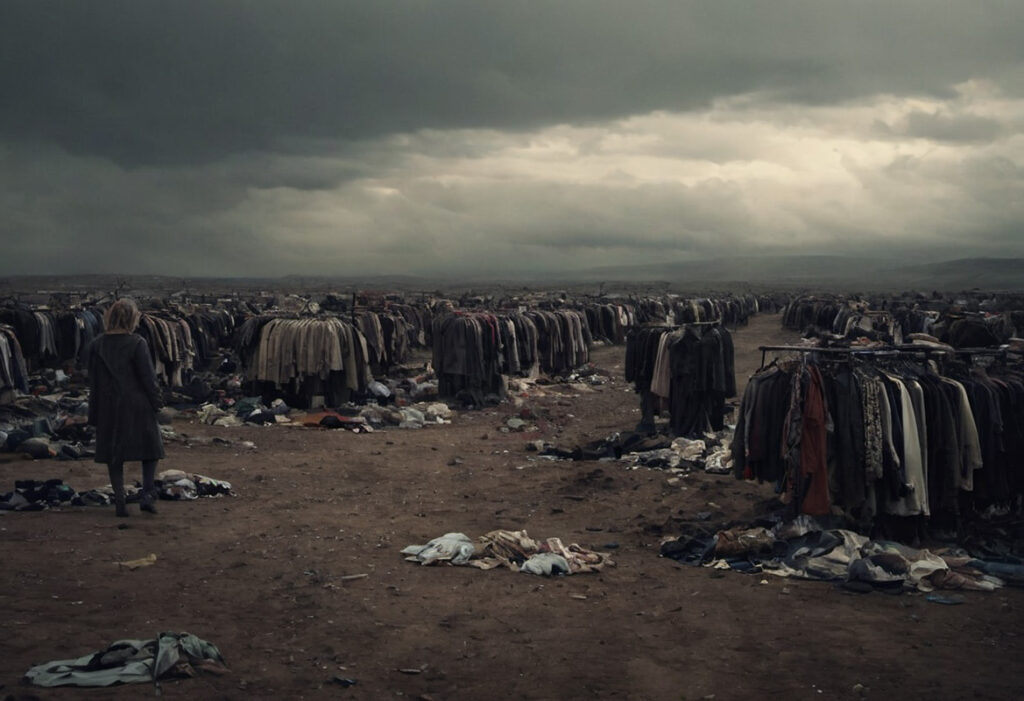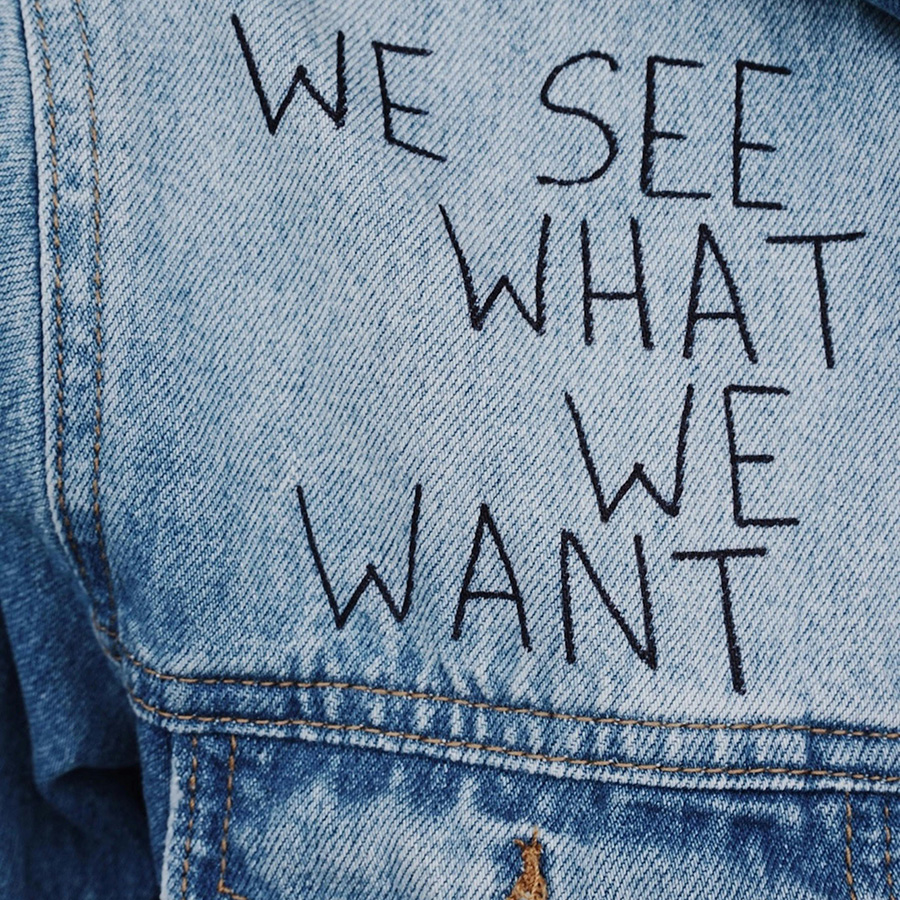Welcome to the whirlwind of modern economic ideologies: Consumption-Driven Capitalism. This beast thrives on two things: economic growth and squeezing every last drop of profit. It’s a system that hinges on a simple idea – the more you buy, the better things look for our economy. We’re talking about a perpetual motion machine where buying and tossing things out has become the rhythm of our lives.
In arenas like fashion, this ideology birthed a culture of rapid turnover and excess production. Trends pop up and vanish in the blink of an eye, pushing consumers to constantly refresh their wardrobes to stay in the game. This relentless dance not only fuels consumption but also churns out mind-boggling amounts of waste, turning last season’s “must-haves” into this year’s landfill fillers.
Consumption-Driven Capitalism isn’t just about fulfilling needs; it’s about manufacturing desires, tweaking ambitions, and fostering a culture where your possessions define your status and success. In this realm, the rule is crystal clear: buy more, ditch faster, and keep that economic engine revving at any cost. But what about the cost to our planet and society? That’s the question we’re diving into as we navigate the murky waters of fashion’s obsession with consumption.
In the mad dash to feed the insatiable appetite of Consumption-Driven Capitalism, the fashion industry has taken center stage in a narrative rife with environmental decay and social injustices.

In the mad dash to feed the insatiable appetite of Consumption-Driven Capitalism, the fashion industry has taken center stage in a narrative rife with environmental decay and social injustices.
Let’s kick off with the toll on the environment. The hunt for raw materials to feed endless production cycles has led to rampant depletion of resources. Forests are razed for cotton fields, waterways poisoned by toxic dyes, and ecosystems disrupted by relentless mining for metals and minerals used in clothing production. The result? Irreversible harm to biodiversity, water scarcity, and a looming climate crisis fueled by fashion’s carbon footprint.
But nature isn’t the only casualty. Behind fashion’s glitz and glamor lies a grim tale of labor exploitation. Sweatshops in developing nations churn out clothes at breakneck speed, often at the expense of workers’ rights, safety, and dignity. From child labor to appalling working conditions, the human toll of fast fashion is immeasurable.
Consumption-Driven Capitalism exacerbates social inequality. The pressure to keep pace with ever-changing trends pushes consumers into a cycle of debt and discontent, while brand elitism creates chasms based on who can afford the latest labels. This division perpetuates an exclusive culture, leaving many behind in the pursuit of material wealth.

In this segment, we strip away the glimmer of consumerism to unveil the stark realities of environmental degradation, labor abuse, and social disparity woven into fashion’s relentless quest for consumption.
At the core of Consumption-Driven Capitalism in fashion lies the juggernaut of fast fashion, a symbol of excess and disposability that drives profit at the cost of sustainability.
Fast fashion embodies the throwaway culture nurtured by consumption-driven capitalism. Clothes are designed for short-lived trends, encouraging rapid turnover and planned obsolescence. The result? Mountains of discarded garments filling landfills, each a testament to a system built on disposability rather than durability.
The relentless trend cycles of fast fashion contribute to waste on a colossal scale. What’s hot today is forgotten tomorrow, leading to overproduction, surplus stock, and the need for constant consumption to keep up with fleeting fads. This throwaway culture not only wastes resources but also perpetuates environmental harm, from energy-intensive production processes to textile waste disposal.
Every time you spend money, you’re casting a vote for the kind of world you want.
Anna Lappé
Fast fashion’s focus on cheap, mass-produced goods often comes at the expense of ethics. Sweatshops and exploitative labor practices are commonplace in the race to cut costs and boost profits. Workers, especially in developing nations, bear the brunt of this relentless pursuit of cheap labor, facing meager wages, long hours, and unsafe work environments.
By scrutinizing fast fashion and disposable culture, we confront the shadowy side of consumption-driven capitalism in fashion. It’s a world where trends vanish quickly, waste piles up, and ethics take a backseat to profit margins—a stark reminder of the urgent need for a shift towards sustainability and ethical practices.
Amidst the chaos of consumption-driven capitalism, alternative economic models emerge as beacons of hope, offering paths to a more sustainable and fair future. One such model gaining traction is the concept of the circular economy, challenging the linear “take-make-dispose” approach.
The circular economy prioritizes sustainability and well-being over relentless growth and consumption. It focuses on resource efficiency, keeping materials in use for as long as possible through reuse, remanufacturing, and recycling. This approach not only cuts waste but also minimizes resource extraction, easing pressure on our planet.
Product longevity is another key tenet of the circular economy. Instead of designing for obsolescence, products are made with durability in mind, fostering repair, reuse, and resale. This shift towards longer-lasting goods reduces waste and challenges the disposable culture fostered by consumption-driven capitalism.
Closed-loop systems are crucial to the circular economy, ensuring materials circulate within a continuous loop rather than being discarded after one use. This minimizes waste at every stage, from design to disposal.
By embracing alternative economic models like the circular economy, we pave the way for a more sustainable and resilient future.

These models prioritize environmental care, economic prosperity, and social well-being, countering the destructive cycle of consumption-driven capitalism in fashion. It’s time to reimagine our economic systems and prioritize sustainability and well-being over endless consumption and growth.

In the labyrinth of consumption-driven capitalism, empowering consumers becomes a catalyst for driving sustainable change in fashion. Despite advertising pressures and fast fashion allure, strategies can empower consumers to make conscious and sustainable choices.
Education plays a vital role. By raising awareness about environmental and social impacts, consumers can make informed decisions. Transparency in supply chains is powerful, enabling consumers to support brands aligned with their values. Ethical branding guides choices, resonating with conscious consumers.
Conscious consumerism is a force for change, involving deliberate choices that consider environmental and social implications. Through it, individuals can support sustainability and challenge harmful practices.
Empowering consumers requires education, transparency, ethical branding, and conscious choices. By arming consumers with knowledge and alternatives, we can shift from mindless consumption to mindful decisions, creating a sustainable fashion industry.

Regulatory interventions and industry changes are essential for a sustainable fashion ecosystem. Standards, policies, and collaborations drive responsible production, transparency, and sustainability.
Initiatives like environmental assessments, waste reduction, labor rights, and supply chain transparency set standards. Policies like tax incentives for eco-friendly methods and penalties for non-compliance promote responsible behavior. Collaborations foster innovation and action.
Collective efforts can transform fashion into a responsible, sustainable ecosystem. Technologies, renewable energy, closed-loop systems, and circular design principles play roles.
Regulatory interventions, policies, and collaborations are vital for a sustainable fashion industry. By aligning frameworks and embracing sustainability, we can create a future where fashion thrives responsibly.
It’s time for action. Join the movement for a sustainable fashion future!









Cosmic Dreamer
I love the idea of fashion innovation towards zero waste! It's time for the industry to prioritize sustainability over fast trends.
Seraphina Thunderwhip
How many perfectly good wardrobes must die to feed the insatiable beast of fast fashion?